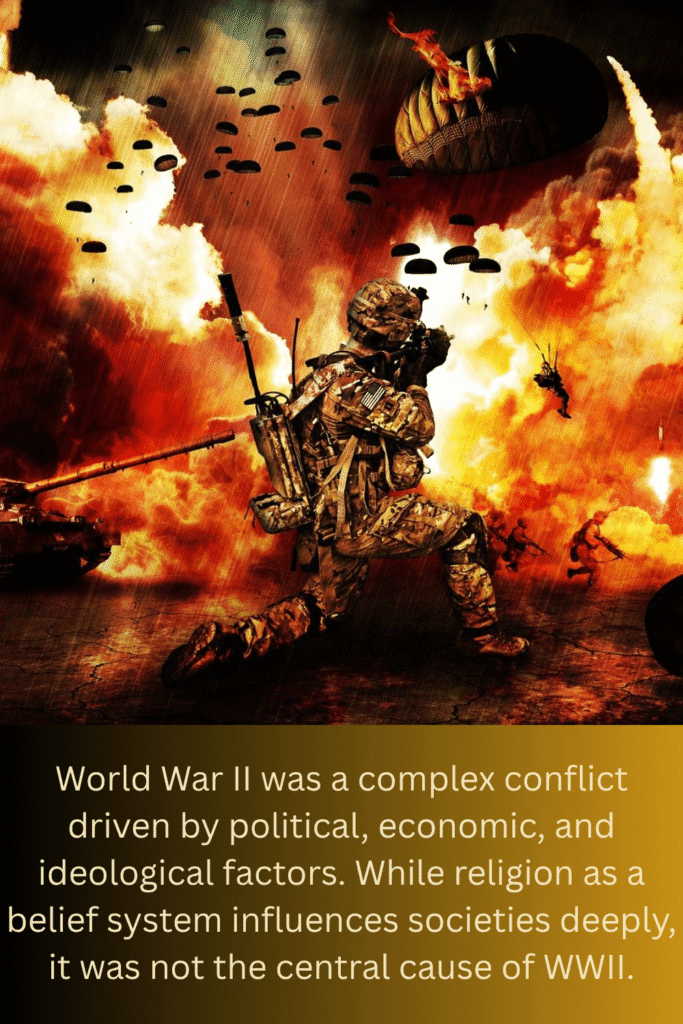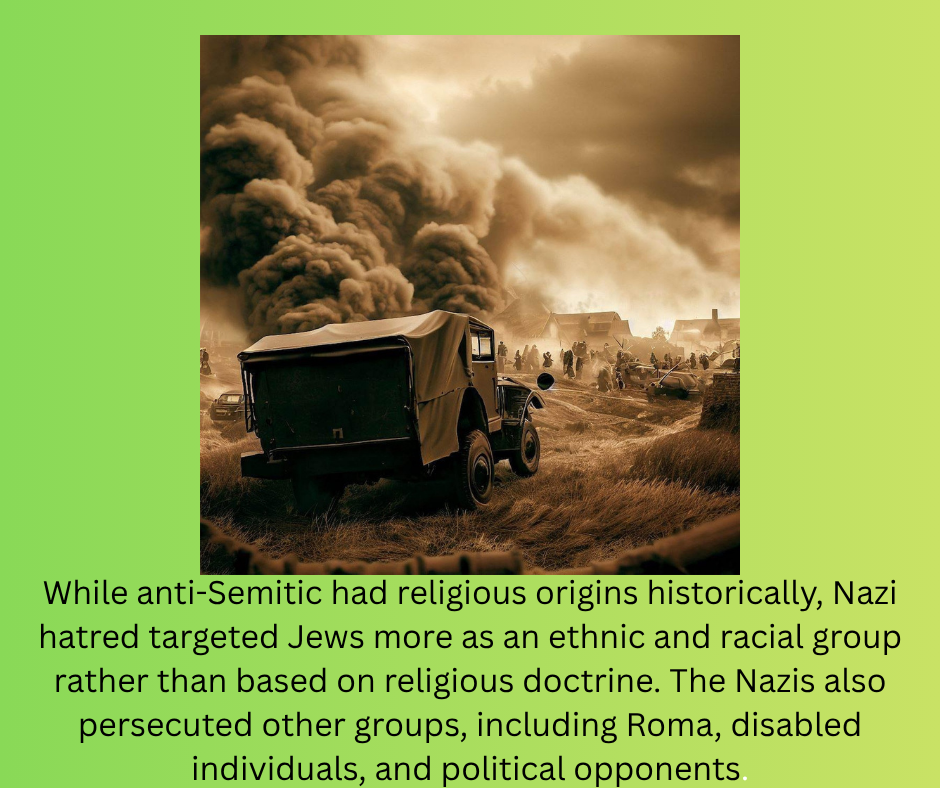World War II caused by religion,It is widely acknowledged that World War II was one of the most catastrophic and revolutionary wars in human history. Spanning from 1939 to 1945, it engaged the majority of the world’s nations and led to millions of fatalities, extensive devastation, and considerable shifts in global politics.
A common question that arises is: Was World War II caused by religion? This article explores the causes of World War II in depth to clarify whether religion played a significant role or if other factors were primarily responsible for the outbreak of this global conflict.

Table of Contents
Introduction:
Unlike some historical wars that were explicitly religious in nature, World War II was a complex conflict driven by political, economic, and ideological factors. While religion as a belief system influences societies deeply, it was not the central cause of WWII.
Instead, factors such as nationalism, militarism, unresolved grievances from World War I, economic instability, and the rise of totalitarian regimes contributed much more to the outbreak of the war.
Causes Leading to World War II
To understand whether religion caused World War II, it’s important to examine the broader causes that led to the conflict:
1. Treaty of Versailles and German Resentment
After World War I, the Treaty of Versailles (1919) imposed harsh reparations and territorial losses on Germany. This treaty created deep resentment among Germans who felt humiliated and economically burdened. The harsh conditions of the treaty intensified nationalist feelings and created a conducive environment for extremist beliefs.
2. The Great Depression and Economic Turmoil
The global economic crisis during the 1930s, known as the Great Depression, devastated many countries, including Germany. High unemployment and poverty made populations more vulnerable to radical political movements promising revival and stability.
3. Rise of Totalitarian Regimes and Ideologies
The interwar period saw the rise of authoritarian regimes, most notably Adolf Hitler’s Nazi Germany, Benito Mussolini’s Fascist Italy, and militarist Japan. World War II caused by religion,These regimes promoted aggressive expansionism, militarization, and ideologies centered on racial superiority, nationalism, and anti-communism.

4. Expansionism and Appeasement
Germany’s aggressive expansion—annexing Austria, invading Czechoslovakia, and ultimately Poland—was met with limited resistance by other European powers initially. Britain and France adopted appeasement strategies, aiming to prevent another catastrophic conflict.
Religion and Ideology in Nazi Germany
World War II caused by religion,Nazi ideology was largely secular but deeply radicalize, focusing on Aryan supremacy and anti-Antisemitism. While anti-Semitic had religious origins historically, Nazi hatred targeted Jews more as an ethnic and racial group rather than based on religious doctrine. The Nazis also persecuted other groups, including Roma, disabled individuals, and political opponents.
Religion as a system of faith and worship was not the motivating factor behind the Nazi agenda. In fact, the Nazi regime often clashed with established churches and religious leaders who opposed their policies. The Nazis sought to control or suppress religious institutions when they conflicted with the state.
Religion in Other WWII Nations
- Japan: The war in the Pacific was driven by Japan’s imperial ambitions and militarism rather than religious motivations. Shintoism played a role in state ideology, promoting emperor worship and nationalism, but the war itself was not fought over religious causes.
- Italy: Mussolini’s fascist regime emphasized nationalism and authoritarian control, not religious warfare.
- Allied Powers: Countries like Britain, France, the Soviet Union, and the United States fought largely over territorial sovereignty, defense, and the defeat of fascism, not religious differences.
Religious Groups and WWII
Although religion was not a cause of World War II, religious groups and communities were deeply affected by the war:
The Holocaust and Religion
The Holocaust, one of the darkest chapters of WWII, targeted Jews primarily as an ethnic group, but their religious identity was also a factor in Nazi persecution. Millions of Jewish people were systematically murdered.
Christian groups had varied roles during WWII — some resisted the Nazis, helping victims and opposing genocide, while others collaborated or remained silent.
Churches and WWII
- Some Christian denominations condemned the war and persecution.
- Some religious leaders were persecuted for opposing Nazi policies.
- Religious faith offered comfort and hope to millions affected by the war’s hardships.
The Role of Ideology vs. Religion in WWII
The main ideologies driving World War II were:
- Fascism: Focused on authoritarian nationalism, state control, and racial purity.
- Communism: Represented by the Soviet Union, focused on class struggle and socialism.
- Democratic Capitalism: Represented by the Allied Western powers, emphasizing democracy and individual freedoms.
Religion did not play a decisive role in these ideological conflicts.
Why the Misconception That WWII Was a Religious War?
Some may mistakenly view WWII as a religious war because:
- The Nazis targeted Jews, who are a religious group, among other victims.
- The conflict encompassed areas characterized by religious diversity and underlying tensions.
- Religious symbols and rhetoric sometimes appeared in propaganda.
However, these factors do not make WWII a religious war. Instead, religion was often caught up in ethnic, racial, and ideological struggles.
Conclusion:
To answer the question clearly: World War II was not caused by religion. While religion and religious groups were deeply affected by the war, the causes of WWII were primarily political, economic, and ideological.
The war resulted from unresolved tensions from World War I, economic instability, nationalist ambitions, and totalitarian ideologies rather than religious conflict. World War II caused by religion,Religion was more a backdrop than a driving force.
Understanding this distinction is crucial for accurately learning from history and avoiding misconceptions that could oversimplify complex global events.